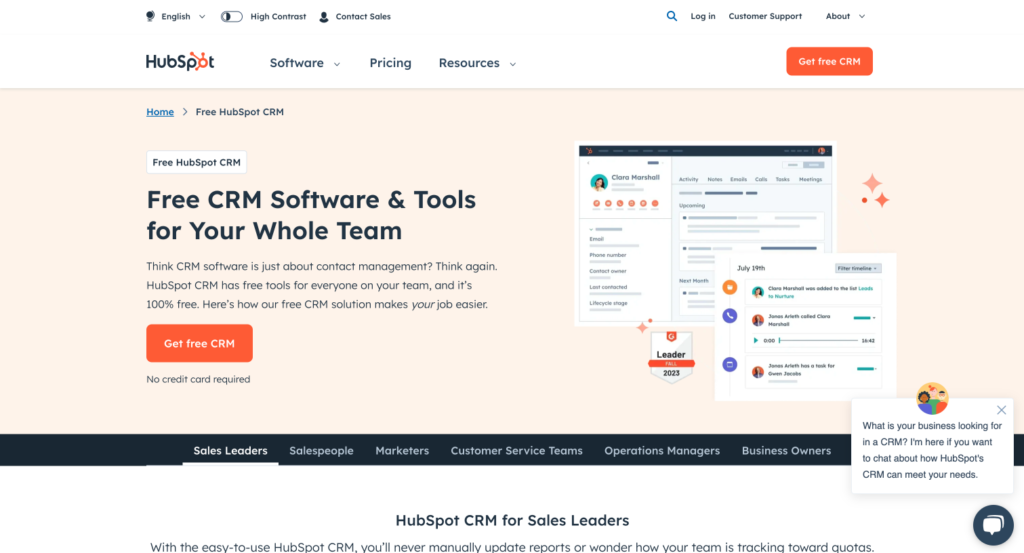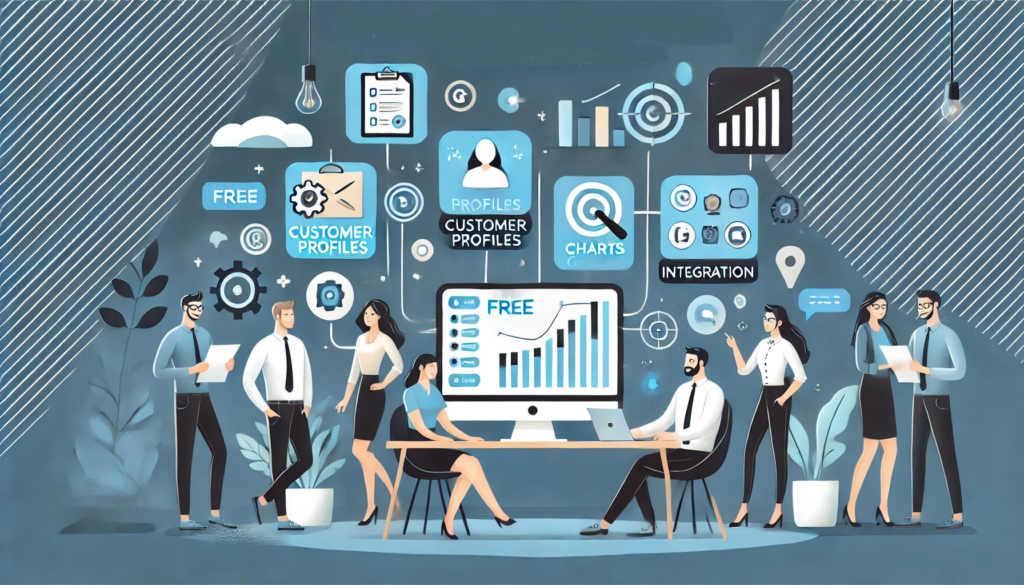Customer Relationship Management systems are vital tools designed to help businesses manage interactions with current and prospective customers. These systems facilitate customer information collection, organization, and analysis across various channels, providing a holistic view of customer engagement. By leveraging CRM software, businesses can streamline operations, improve customer communication, and make data-driven decisions that enhance customer satisfaction and loyalty.
For small businesses, CRM is more than just software; it’s a strategy that can transform their approach to customer relations. CRM systems help small businesses manage leads more effectively, track customer interactions, and tailor marketing efforts to individual needs. Research indicates that CRM can increase sales by up to 29% and improve sales productivity by up to 34%. Moreover, CRM applications enhance customer retention, with companies reporting significant improvements in customer satisfaction and service quality.
1. Understanding SaaS CRM
The Software as a Service CRM is a cloud-based system that delivers applications over the Internet, allowing businesses to use software on a subscription basis without the need for internal infrastructure or IT overhead. This model enables businesses to access the CRM application through the web or an API, focusing on ease of use, scalability, and remote accessibility.
For small businesses, SaaS CRM offers a range of strategic advantages. It eliminates the need for significant upfront investments in hardware and software, which can be prohibitive for smaller companies. Instead, SaaS CRM provides a cost-effective solution with a subscription model that scales with business needs. This aspect is particularly beneficial for small businesses looking to grow without heavy capital expenditure.
Advantages of Using SaaS CRM for Small Businesses
1. Cost-Effectiveness
SaaS CRM removes the steep costs associated with traditional CRM systems by offering a subscription-based model. This approach significantly lowers entry costs and spreads out expenses over time, making advanced CRM functionalities more accessible to small businesses.
2. Scalability
As businesses expand, SaaS CRM can easily scale to accommodate growth in customer data, users, and features without requiring new hardware or significant system overhauls. This flexibility allows small businesses to adjust their CRM capabilities as their needs evolve.
3. Accessibility and Mobility
With SaaS CRM, users can access customer data and manage relationships from any device with internet connectivity. This is crucial for businesses with remote teams or those that require access to CRM capabilities while on the move.
4. Enhanced Collaboration
SaaS CRM promotes better coordination among sales, marketing, and customer service teams by providing a unified platform where all team members can access up-to-date customer information and communications. This integration helps in delivering a cohesive customer experience and streamlines internal processes.
5. Automation and Efficiency
By automating routine tasks such as data entry, lead scoring, and customer communications, SaaS CRM enhances operational efficiency and allows sales teams to focus more on selling and less on administrative tasks.
6. Data Security and Compliance
SaaS CRM providers invest heavily in security measures to protect sensitive customer data against cyber threats, ensuring that small businesses comply with regulations like GDPR. This is a significant advantage, as maintaining such high levels of security in-house can be costly and complex.
2. Exploring 100% Free CRM Options
Is There a 100% Free CRM? Yes, there are indeed 100% free CRM options available that provide essential functionalities for managing customer relationships without a cost. These free versions are particularly suitable for small businesses, startups, or any organization needing basic CRM tools without financial commitment.
Several CRM platforms offer free versions with varying degrees of functionality. For example, HubSpot CRM provides a comprehensive set of tools for sales, marketing, and customer service at no cost, supporting unlimited users and up to one million contacts. Another notable option is Bitrix24, which is praised for its extensive free offering suitable for unlimited users, making it ideal for businesses with a growing team. Zoho CRM also offers a free plan that includes basic features suitable for smaller teams.
While free CRM solutions can be highly beneficial, they often come with limitations that could prompt a need for upgrading to paid versions as business needs grow. Common limitations include caps on the number of users, reduced data storage, limited customer support, and basic integration capabilities. For instance, free plans often restrict the number of emails that can be sent or the amount of data that can be stored, and may only offer community-based support rather than direct access to customer service.
Moreover, businesses might encounter indirect costs such as the need for additional training for staff to use more complex features that are typically unlocked with paid plans. As businesses grow, the scale of their CRM needs might exceed what’s available for free, necessitating an upgrade to more robust, paid CRM solutions that offer greater functionality and more advanced features.
In conclusion, while there are numerous effective free CRM options available, businesses should carefully consider their specific needs against the limitations of free versions. Often, a paid CRM might be more cost-effective in the long run when considering scalability, support, and additional features that enhance productivity and customer interaction.
3. In-depth look at HubSpot

HubSpot CRM stands out in the CRM market for its robust free offering, which is notably comprehensive compared to many competitors. Aimed at small to medium-sized businesses, it provides a wide array of tools without any costs attached. HubSpot CRM is especially lauded for its scalability, making it an ideal choice for businesses looking to grow without initially investing in expensive software solutions. The platform supports an unlimited number of users and can manage up to one million contacts, which is a significant advantage for expanding businesses.
Key Features of HubSpot Suitable for Small Businesses
HubSpot CRM offers a suite of features that are particularly beneficial for small businesses. These include:
1. Contact Management
Allows businesses to store contact details efficiently, track every interaction with contacts, and manage customer information through a streamlined interface.
2. Email Tracking & Notifications
Provides insights into when and how often emails are opened, which helps sales teams optimize their follow-up strategies.
3. Deal Pipeline Management
Users can create and manage multiple sales pipelines with detailed reports on sales activities, helping businesses forecast growth and manage sales processes effectively.
4. Marketing Automation
Integrates with marketing tools to facilitate automated marketing campaigns, lead tracking, and measure ROI from various marketing efforts.
5. Reporting Dashboards
Offers customizable reporting tools that provide visual data on sales, productivity, and performance metrics, enabling businesses to make informed decisions based on real-time data.
How HubSpot Supports Various Business Operations
HubSpot’s broad functionality extends beyond just sales and marketing:
– Customer Service: HubSpot includes tools to enhance customer service operations, such as ticketing systems, feedback surveys, and knowledge bases, all designed to improve customer satisfaction and support.
– Operations Management: With features like automated workflows and internal process management, HubSpot helps businesses streamline their operations, reduce inefficiencies, and save time.
– Integration Capabilities: HubSpot offers extensive integration options with other tools and platforms, which allows businesses to connect their CRM system with other essential software solutions like accounting, e-commerce, and more, creating a cohesive technology ecosystem.
4. Examination of Bitrix24
Bitrix24 is a comprehensive CRM platform that offers a wide range of tools for collaboration, communication, and management of business operations. It is designed to serve small to medium-sized businesses across various sectors. The platform combines classic CRM functionalities with advanced project management, website building, and team collaboration features, making it a versatile tool for businesses looking to centralize their operations in one platform.
Detailed Analysis of Bitrix24 Features for Small Businesses
Bitrix24 provides several features that are particularly useful for small businesses:
1. CRM and Sales Management
Bitrix24’s CRM system allows businesses to manage customer interactions, automate sales processes, and analyze sales data to enhance customer relationships and boost sales performance.
2. Task and Project Management
The platform includes extensive tools for task scheduling, delegation, and monitoring, which help in managing projects efficiently and ensuring timely completion of tasks.
3. Communication Tools
Bitrix24 offers built-in tools for internal communication, including chat, video conferencing, and social networking features, which facilitate seamless communication within teams.
4. Marketing Automation
Features like email marketing, lead management, and targeting help in automating marketing campaigns and tracking their effectiveness.
5. Website Builder
Small businesses can use Bitrix24 to create and manage their websites, integrate e-commerce features, and track visitor interactions directly from the CRM.
Comparison of Bitrix24 with Other CRM Software
When compared to other CRM solutions like HubSpot or Salesforce, Bitrix24 stands out due to its integration of CRM with a broad suite of collaboration and project management tools. While platforms like Salesforce and HubSpot may offer deeper CRM functionalities with more advanced analytics and marketing tools, Bitrix24 provides a more cost-effective solution for small businesses that need a diverse set of tools beyond just customer relationship management. Here’s how Bitrix24 compares:
– Pricing: Bitrix24 is generally more affordable, offering a free tier with substantial capabilities, which is particularly beneficial for small businesses or startups operating on a tight budget.
– Ease of Use: While Bitrix24 offers a wide range of features, new users may find the platform somewhat overwhelming compared to the more streamlined interfaces of HubSpot or Salesforce. The complexity of features requires a steeper learning curve.
– Customization and Flexibility: Bitrix24 provides extensive customization options, allowing businesses to tailor the platform according to their specific needs. However, this flexibility can also add to the complexity of the system.
– Integration Capabilities: Like its competitors, Bitrix24 offers robust integration capabilities, but it is particularly strong in integrating internal communications and project management within the CRM system, which is not always the case with other CRMs.
5. Google RM: The Emerging Player
Google RM, though not a distinct, standalone CRM product, comprises a range of relationship management tools embedded within Google’s ecosystem. These tools collectively enable businesses to manage customer relationships and interactions efficiently. Google RM leverages various Google services to facilitate comprehensive customer management and streamline business operations.
Google RM’s integration with existing Google services creates a cohesive system for managing customer relationships. For instance, Google Contacts serves as a central repository for storing and organizing customer information, which is accessible across all Google platforms. This integration ensures that contact details are consistently updated and synchronized.
Gmail plays a crucial role by incorporating relationship management features directly into the email experience. Businesses can track communications, manage interactions, and use email data to gain insights into customer engagement without leaving their email environment. Google Calendar complements this by managing schedules and appointments, helping businesses keep track of important dates and follow-ups.
Furthermore, Google Analytics enhances Google RM by offering detailed insights into customer behavior on websites and applications. This data helps businesses understand how customers interact with their digital properties, allowing for more targeted marketing and sales strategies.
Benefits of Using Google RM for Small Businesses
Google RM offers several benefits tailored to small businesses, particularly due to its integration with Google’s broader ecosystem. The cost efficiency is a significant advantage, as many features are included with existing Google services such as Gmail and Google Workspace, which small businesses may already be using. This integration eliminates the need for additional software purchases and reduces overall costs.
The seamless connectivity between Google services ensures that all customer data is unified and easily accessible. This integration enhances productivity by allowing businesses to manage contacts, schedule appointments, and track interactions from a single platform. Additionally, the robust analytics provided by Google Analytics offers valuable insights into customer behavior, enabling small businesses to make data-driven decisions without investing in separate analytical tools.
Overall, Google RM’s integration with Google’s suite of services provides small businesses with a powerful, cost-effective solution for managing customer relationships and operations, enhancing their ability to serve and engage with customers effectively.
6. Choosing the Right Free CRM for Your Small Business
Choosing the right free CRM for your small business involves evaluating several critical factors to ensure the CRM meets your needs effectively. Key considerations include:
– Feature Set: Assess the CRM’s features to ensure they align with your business requirements. For instance, consider whether you need functionalities like email marketing, sales tracking, or project management. A CRM with a comprehensive feature set can support various business functions and provide more value.
– Ease of Use: The CRM should be user-friendly and intuitive. A complex system might require extensive training, which could be a challenge for small teams with limited resources. Look for a CRM with a straightforward interface that minimizes the learning curve.
– Integration Capabilities: Evaluate how well the CRM integrates with other tools and platforms your business uses, such as email services, accounting software, or e-commerce platforms. Seamless integration can streamline workflows and improve efficiency.
– Scalability: Even if you start with a free CRM, consider whether it can scale as your business grows. Some CRMs offer additional features and capabilities in paid plans that can be unlocked as your business needs to expand.
– Customer Support: Reliable customer support can be crucial, especially if issues arise. Free CRMs often come with limited support options, so assess what level of support is available and whether it meets your business’s needs.
How to Evaluate the Needs of Your Business Against CRM Features
To match your business needs with CRM features, start by defining your specific requirements. Identify the key functions that are essential for your operations, such as contact management, sales automation, or customer service tools. Next, map these needs to the features offered by different CRMs. For instance, if you require robust sales tracking and reporting, ensure that the CRM provides these functionalities effectively.
Additionally, consider the size of your team and the volume of data you manage. Some free CRMs have limitations on the number of users or the amount of data you can store, which might impact your decision. Evaluate how well the CRM’s features align with your business processes and whether it supports the workflows critical to your operations .
Tips for Implementing a Free CRM Effectively
Implementing a free CRM effectively involves several steps to maximize its benefits:
1. Train Your Team: Ensure that your team is well-trained in using the CRM. Provide resources such as tutorials or webinars to help them get up to speed. Proper training can enhance adoption rates and ensure that the CRM is used to its full potential.
2. Customize the CRM: Take advantage of any customization options available in the CRM to tailor the system to your specific business needs. Customize fields, workflows, and dashboards to align with your business processes and make the CRM more relevant to your operations.
3. Regularly Review and Update: Periodically review the CRM’s performance and its impact on your business. Make adjustments as needed to ensure it continues to meet your evolving needs. Regular updates and evaluations can help you identify any gaps and address them promptly.
4. Leverage Integration: Integrate the CRM with other tools and platforms you use to streamline processes and enhance data flow. Integration can improve efficiency and ensure that your CRM works seamlessly within your existing tech stack.5. Monitor and Optimize: Use the CRM’s analytics and reporting tools to monitor performance and gather insights. Continuously optimize your CRM usage based on these insights to improve customer relationships and business operations.

